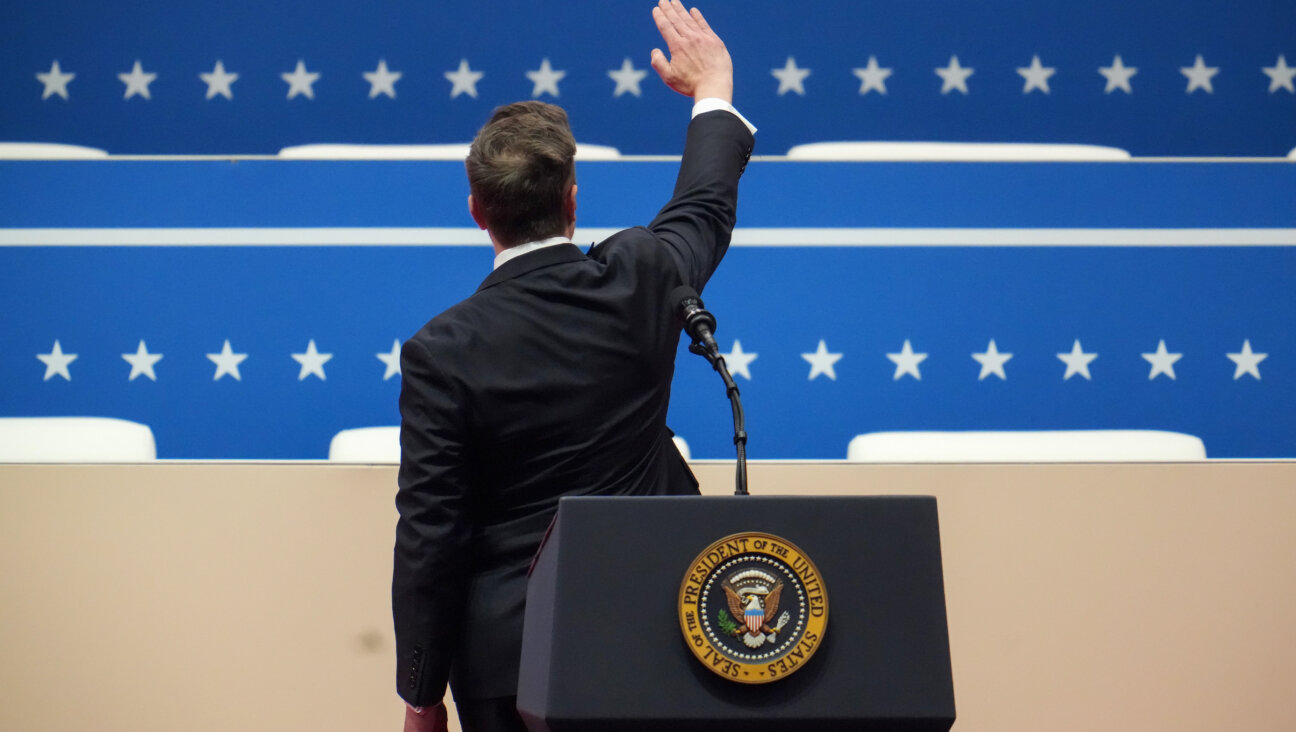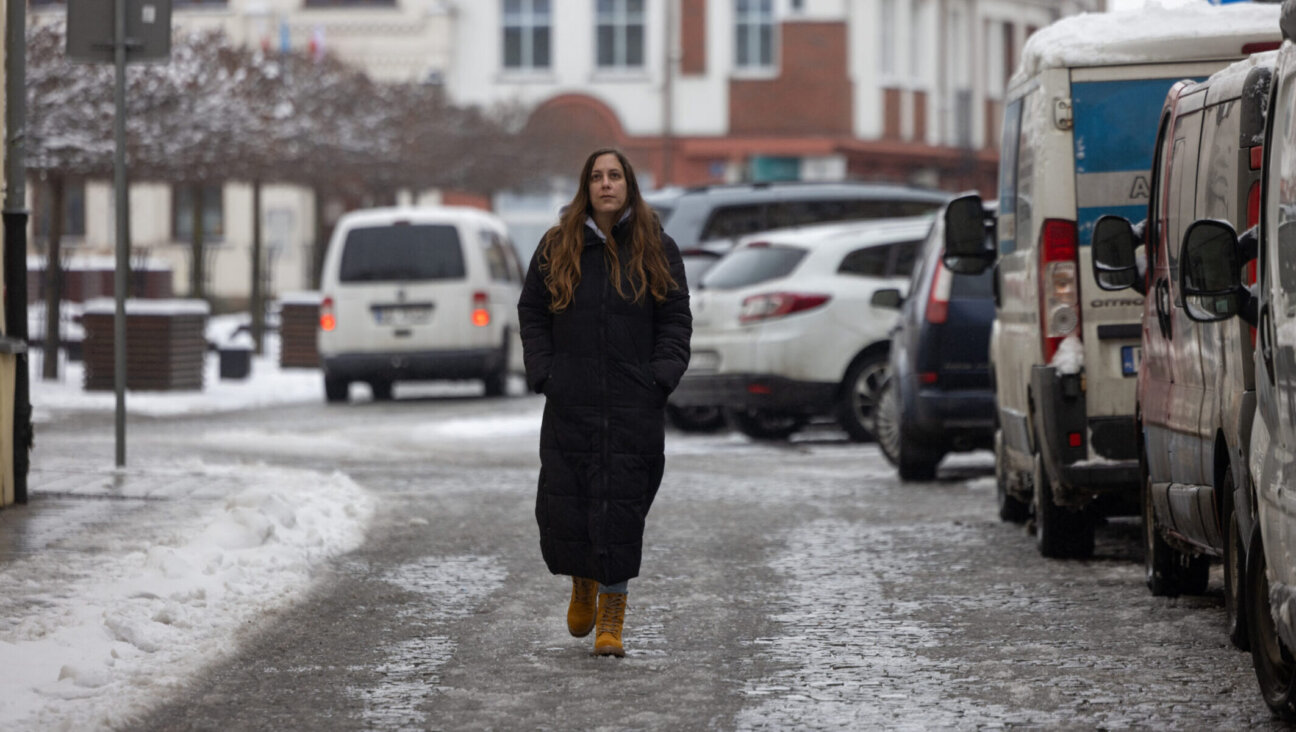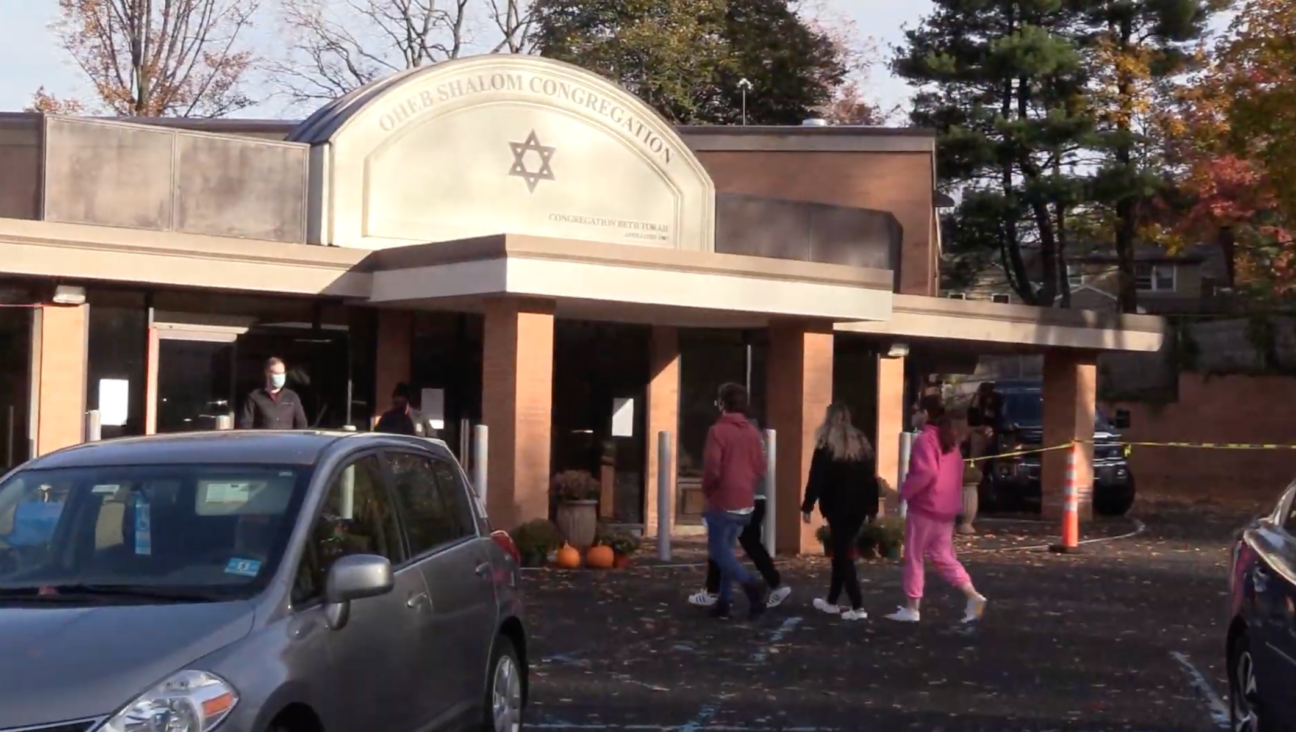After Synagogue Shooting, Congregants Daunted By Looming, Lengthy Death Penalty Process

Artwork hangs on the fence surrounding the now-shuttered Tree of Life building. Image by Molly Boigon/The Forward
In Terre Haute, Indiana, a man named Marvin Gabrion has been in prison awaiting death for 17 years, seven months and 11 days. He committed his crimes in 1996 and 1997, then was tried, convicted of murder and sentenced in 2002. Gabrion is currently the longest-serving inmate on federal death row, and though he terrorized Michigan in the 1990s, for many of those affected by last year’s synagogue shooting in Pittsburgh, drawn-out federal litigation like Gabrion’s is the stuff of today’s nightmares.
Pittsburgh’s Jewish community found out a few weeks ago that the alleged Tree of Life shooter, Robert Bowers, will be facing the death penalty in federal court. As the community prepares for the commemoration of the shooting this Sunday, many look ahead with growing anxiety at what will likely be decades of trials and appeals.
“That just means that every year or so, I have to attend another hearing and say, he killed three of my beloveds, and every year, to do the same thing just increases the trauma,” said Stephen Cohen, the co-president of New Light, one of the three congregations in the Tree of Life*Or L’Simcha building during the shooting last October.
Some are opposed to capital punishment on principle, but more broadly, congregants and synagogue leaders said they fear the seemingly infinite appeals process, the rehashing of witness testimony, the media circus, the elevated platform for the alleged shooter, the dredging up of graphic evidence and the drumbeat of reminders that horrific violence killed 11 people and rocked the community in Squirrel Hill last year.
The alleged shooter, Bowers, posted anti-immigrant and anti-Semitic sentiments online before entering the Tree of Life building with an AR-15-style assault rifle and at least three handguns. He targeted one of the congregations in the building, Dor Hadash, for its work with HIAS, a Jewish nonprofit that serves refugees, and told law enforcement after his arrest he thought Jews were committing genocide against his “people.”
One of Bowers’ lawyers, Judy Clarke, told a judge in February his defense team was willing to avoid trial and negotiate a guilty plea in exchange for a life sentence. Rabbis and members at multiple area synagogues, including New Light and another temple in the Tree of Life building, Dor Hadash, also wrote to Attorney General William Barr asking him not to pursue the death penalty.
But other Jews in Pittsburgh said the community should not focus on the work of the federal government. Tree of Life congregant Brian Schreiber said he has not heard a “predominant theme” around the “appropriate punishment” for Bowers.
“We’re letting the justice folks do the justice work,” he said.
The Justice Department announced its decision to pursue the death penalty in Bowers’ case over the summer. Neither Bowers’ attorneys nor the Justice Department responded to requests last week to discuss the case.
This month, the community found out jury selection is scheduled to begin next September 14, likely placing the start of the trial squarely in the midst of next year’s High Holidays and right before the two-year mark of the shooting, October 27.
“It’s an insensitivity,” said Dor Hadash President Donna Coufal. “It was right during the High Holidays that this was being announced, so they kind of knew what time of year it was.”
Before the jury selection even starts, there will be “an extensive period of pretrial motions,” according to Robert Dunham, executive director of the Death Penalty Information Center. He said the courts would weigh questions about the mental status of the defendant, among other legal considerations.
The case will require a large jury pool and a detailed jury questionnaire about peoples’ relationships to the victims, to the Jewish community and to capital punishment, he said.
Once a jury is selected, there will be a trial featuring “extraordinarily traumatic testimony” from survivors and witnesses as well as graphic photos and other evidence from the crime scene, said Dunham. During this stage, the jury will determine guilt or innocence.
If the jury convicts, the trial enters the penalty phase, during which jurors decide between a death sentence and a lesser sentence, like life without parole. Witnesses might be asked to testify again about the impact of the shooting.
If a death sentence is imposed, there are more stages of appeal and review. If all of the appeals are exhausted, there are yet more options for the defendant, like seeking a pardon.
“Typically, court proceedings in a federal case will continue for at least a decade,” said Dunham.
The protracted trial and appeals process also gives more exposure to the alleged shooter and raises the risk of copycat attacks that use the shooting as a “benchmark,” said Brad Orsini, the director of Jewish Community Security at the Jewish Federation of Greater Pittsburgh. The shooter who attacked worshipers at a mosque in New Zealand this year cited the Pittsburgh attack.
“The more that the actual subject who committed this crime is in the news, the more you have the ability to have like-minded people follow it, read about it and potentially act out because of it,” he said.
The Justice Department’s decision to seek the death penalty despite community opposition likely comes down to politics. The trial will be fresh in voters’ minds for the November 2020 presidential election, said Ron Tabak, a lawyer based in New York who chairs who chairs the Death Penalty Committee of the American Bar Association’s Section of Civil Rights and Social Justice.
“The conventional wisdom among politicians for a long time has been that you’re never going to lose any election for out-toughing on crime your opponent,” he said.
Tabak, who is Jewish, has worked to raise awareness about due process concerns in capital punishment cases for more than ten years. He also criticizes what he views as a pattern of insulting Jewish communities in cases like Bowers’.
Tabak said prosecutors in death penalty cases often use mistranslations of Jewish texts in court to convince jurors to choose the death penalty.
While Jewish texts are not unambiguously against capital punishment, he said a clear trend in the Torah is opposition to executions. Tabak explained the passages most frequently quoted by prosecutors, like Genesis 9:4-6, are misinterpreted. That series of verses includes a text translated as “Whoever sheds the blood of man, by man shall his blood be shed.” Some scholars argue the correct translation is “He who sheds the blood of a human, for that human shall his blood be shed,” which suggests only God is meant to shed the blood of a person.
“It is really, really inappropriate, and should not be allowed, for prosecutors to quote in a very improper, mischaracterizing and often getting 100-degrees-backwards what is meant by some of these biblical passages, and to get away with that,” said Tabak.
Tabak also said the Pittsburgh case fits into a pattern of prosecutors being more receptive to Christian communities who oppose the death penalty. He said Jewish communities rallying against an execution, as the cases of famous death row inmates Ethel Rosenberg, Troy Davis, Karla Faye Tucker and Steven Oken, typically aren’t “given the same solicitous reception that other faith groups may have been given.”
Responding to communities’ wishes after they’re impacted by criminals on death row can help them heal, Tabak said.
“We have found that when there are efforts to show great concern for the victims/survivors, and to try to look at what their interests are and what they really care about, that that can help them a great deal,” he said.
Until the trial, the Justice Department has asked witnesses not to talk about the day’s events to ensure a fair process. Stephen Cohen of New Light said he’s not worried about being able to recall his memories for the courts. The details are “seared” into his brain.
“Nobody’s looking forward to it,” he said. “You have to relive everything.”
Correction, October 29, 2:46 p.m.: A previous version of this story misspelled the name of Steven Oken.
Molly Boigon is the investigative reporter at the Forward. Contact her at [email protected]
A message from our Publisher & CEO Rachel Fishman Feddersen

I hope you appreciated this article. Before you go, I’d like to ask you to please support the Forward’s award-winning, nonprofit journalism so that we can be prepared for whatever news 2025 brings.
At a time when other newsrooms are closing or cutting back, the Forward has removed its paywall and invested additional resources to report on the ground from Israel and around the U.S. on the impact of the war, rising antisemitism and polarized discourse.
Readers like you make it all possible. Support our work by becoming a Forward Member and connect with our journalism and your community.
— Rachel Fishman Feddersen, Publisher and CEO
























